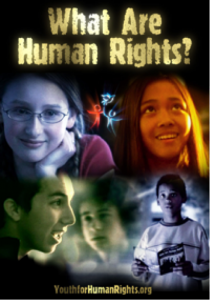Are Children the Hidden Victims of COVID-19?

Children’s increased online presence has inadvertently placed them at higher risk of exploitation making Internet safety more important now more than ever. Photo: iStockphoto
How does the pandemic effect human trafficking and how can you help?
A solid understanding of human rights instills confidence in youth.”
WASHINGTON, DC, USA, May 13, 2020 /EINPresswire.com/ -- The COVID-19 pandemic is putting the world under enormous strain, affecting the lives of everyone. Measures taken by the U.S. Government to help flatten the curve include stay-at-home orders, quarantines, travel restrictions, and limitations on business and everyday activities. While we work to protect the health of our citizens, illicit businesses are going more underground. At first glance, increased police presence on the streets seemed to reduce crime in big cities like LA, New York and Washington, D.C, however, according to a recent report released by the United Nations, in some cases the pandemic has driven certain criminal enterprises even further underground. When it comes to criminals who deal in trafficking persons, particularly children, criminals are adjusting their business models to fit this “new normal” created by the pandemic. Like many businesses around the world, they are moving to increase their business more online. One of their key targets? Children. — Erica Rodgers, Director of the National Office of Youth for Human Rights
Traffickers are well aware that millions of children around the globe are at home due to the current pandemic. Traffickers will often prey on children and use the Internet to disguise their identity. Many will portray themselves as just another high school student, upset about being stuck home. School closures and the implementation of distance learning have increased many children’s online presence and inadvertently placed them at higher risk of exploitation.
On April 21, 2020, Virginia detectives put together a task force called Operation COVID Crackdown that resulted in 30 individuals being arrested for being involved in or purchasing children online for sex.
Everyone has a role to play in combating human trafficking. Recognizing the signs of human trafficking is the first step to identifying a victim. Even with many people still under stay-at-home orders, there are many ways that individuals can be alert and on the lookout to spot signs of human trafficking online.
The National Office of Youth for Human Rights International, located in Washington, D.C., recently delivered online trainings on how to spot the signs of human trafficking. This included special training on how to be aware as a citizen, or even a parent, on how to spot key indicators of child sex trafficking. These indicators are just as relevant to in-person interactions along with online interactions.
Signs of child sex trafficking might include:
• Multiple phones or social media accounts
• Lying about the existence of social media accounts
• Provocative pictures posted online or stored on the phone
• Sexually provocative clothing
• Tattoos or branding
• Refillable gift cards
• Changes in behavior such as frequent lying or increased fear or agitation
• Changes in school attendance, habits, friend groups, vocabulary, demeanor and attitude
• Unexplained injuries
• Social interaction and schedule being strictly controlled by someone else
• Isolation from family, friends, and community such as refusing phone calls and being noticeably more distanced from loved ones.
• Sudden appearance of luxury items, e.g., manicures, designer clothes, purses
Anyone can help report human trafficking by paying attention to the red flags listed above and reporting them in a timely manner. Individuals are cautioned to not approach traffickers themselves because they could put themselves in danger and jeopardize future prosecution of the buyers or pimps in danger. It is recommended to call the National Human Trafficking Hotline and report any suspected instances of human trafficking. It is better to call and report suspected trafficking then not to report at all. By identifying victims and reporting tips, you are doing your part to help law enforcement rescue victims, and you might save a life.
National Human Trafficking Hotline (NHTH), call 1-888-373-7888 or text HELP or INFO to BeFree (233733).
If you think a child is being exploited online, the National Center for Missing and Exploited Children has a 24/7 CyberTipline where you can anonymously report tips at: https://www.missingkids.org/gethelpnow/cybertipline
You can learn more about the signs of human trafficking by reading other free resources provided by organizations such as Polaris Project. https://polarisproject.org/recognizing-human-trafficking/
Parents should know how to strengthen their child’s confidence and reduce their susceptibility to becoming trafficked. At a recent training, Youth for Human Rights National Office Director Erica Rodgers stated, “A solid understanding of human rights instills confidence in youth. Pimps and recruiters don’t target confident youth. They look for the shy and insecure youth. The ones they can manipulate. By ensuring youth are confident and know how to protect their rights, we help prevent them from being the target of traffickers.”
Youth for Human Rights International has been working to prevent human trafficking on a national and international level for over a decade. Raising awareness of human rights is the necessary undercut to this and so many other human rights issues. Article 4 of the Universal Declaration of Human Rights states: “No one shall be held in slavery or servitude; slavery and the slave trade shall be prohibited in all their forms.” To read all of the human rights as listed in the Universal Declaration of Human Rights go to: http://www.un.org/en/universal-declaration-human-rights
About Youth for Human Rights:
Youth for Human Rights International (YHRI) is a nonprofit organization whose mission is to teach youth about human rights, specifically the United Nations Universal Declaration of Human Rights, and to inspire them to become valuable advocates for tolerance and peace. YHRI advocates for human rights both in the classroom and in nontraditional educational settings such as through art series, concerts and other interactive community events, including regional and international human rights summits which bring youth together from across whole sectors of the world. Their most recent campaign has included #KnowYour30 with the deliberate purpose of increasing awareness of the 30 human rights every person has -- and how they are a part of everyday life. To learn more about human rights go to https://www.youthforhumanrights.org. For a documentary on Youth for Human Rights and its founder, go to https://www.scientology.tv/series/voices-for-humanity/mary-shuttleworth.html.
Press Office
Youth for Human Rights International - National Office
+1 202-667-6404
email us here


